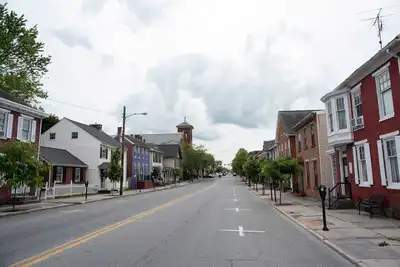
Difficulty, however, remains substantial for nonprofit efforts, a scale challenge that existing commercial telecom providers will frequently emphasize.
Right now, Community Media is trying to pull together $3 million for the first phase of its network plans, which would serve about 1,200 homes throughout Adams County. The project leaders cite a good deal of upfront expenses, with planning studies running as much as $50,000. They already won some grant money over the last two years and worked with firms to complete a feasibility study. Engineers have given estimates it’ll cost $15,000 to $30,000 per mile to lay fiber-optic cable. The total cost for the county may wind up ranging between $50 million to $100 million, Gouker estimated.
Such infrastructure, they say, could revitalize the corridor, helping to lay broadband along a local highway serving several adjacent businesses as well as helping a local community college.
They have eyed several potential sources of funding and see the federal pandemic relief passed in March as particularly promising. Other options have faltered. They hired an external firm to help navigate what they judged a complicated application process for an FCC rural broadband auction the previous year but discovered they would not be able to win much money. And the Agriculture Department’s especially low standards for broadband speeds knocked them out of the running for federal aid from USDA programs because under those standards, Adams County is generally considered connected.
Some sections of the county will be money-losers, they acknowledge, but they say the upsides are more important, particularly in the long term.
In Washington, the broadband debate revolves mostly over the role of the private sector versus public.
Republicans oppose cutting out the private sector, despite their own interest in delivering connectivity for rural constituents who tend to vote Republican. Adams County itself has typically leaned to the right, with Biden winning only 32 percent of the vote last November. Republicans raised these broadband concerns in an Oval Office meeting this spring with Biden and Harris discussing infrastructure.
“You can’t have a scenario where the federal government comes in and serves as your employer, serves as your mother, comes in and addresses your every need,” one attendee, Rep. Garret Graves (R-La.), said afterward. “It’s unaffordable, it’s unhealthy.”
The White House’s emphasis on municipal broadband is “a source of great concern; it’s a path we don’t need to get started down,” top Senate Commerce Committee Republican Roger Wicker of Mississippi said in a mid-May interview during the heat of Senate GOP infrastructure negotiations with the White House. “I think we can demonstrate that that’s not a good approach based on competition and history.”
Instead, a top GOP priority is to streamline the permitting process to make it easier for private internet providers to build out broadband, particularly on federal lands. Republicans also commonly say the federal government should do a better job of marshaling and coordinating existing broadband subsidies, which number in the tens of billions of dollars, before launching several scores of billions more. They caution about funding projects that compete for business in areas that internet providers already claim to serve, which could chill the industry’s investment of their own capital.